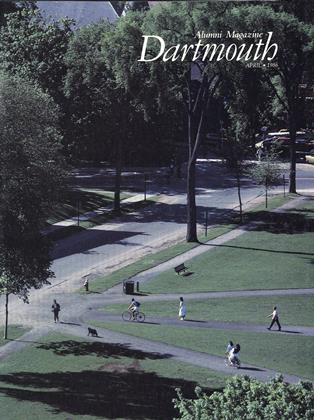One of the less visible aspects of the Dartmouth athletics program that will benefit from the renovation of the College's sports facilities is the training program. "When the Berry complex is completed," head trainer Fred Kelley explains, "the training staff will be centralized in Alumni Gym. Having a centralized office and central coverage has definite advantages. The coaches are used to on-site coverage and specialized attention because of the large size of our staff. But, as is the case at many bigger schools, if someone gets hurt they go to the central training office for attention and there is always someone there." Kelley says when the new office opens in the gym it will be located under the basketball stands where the Nautilus equipment and free weights are now-that the whole staff will work out of it. However, he notes, "although we will be working out of one main office, we will still be operating taping rooms at our satellite facilities."
Kelley, who has been at Dartmouth since 1967 and has also served as freshman, junior varsity, and head baseball coach, keeps up with the latest advances in sports medicine. "One of the biggest advances in sports medicine has to be arthroscopy," he says. "It benefits everyone from the athlete to the trainer. Before this procedure we had a couple of options how to treat an injured knee. We could throw the leg in a cast for eight weeks without knowing what was wrong with it and hope the injury healed itself. Or we could inject the knee with water and radioactive dye and then go through a series of stress x-rays to find the problem." But, he explains,"neither of these two practices were very effective."
With the arthroscope, Kelley says, "the doctors can look inside the knee without opening the whole thing and tell exactly what is wrong, where the damage is, and the extent of the damage. I go to the hospital quite often to look at the knee myself so I can better judge the best plan of rehabilitation."
Prevention of injuries, however, remains Kelley's prime goal. "Even with the scope," he says, "the biggest help a trainer can ask for is prevention. Every year the ECAC Rules Committee asks trainers what recommendations they have to make football safer. Every year I say the same thing: 'Adhere strictly to the rules you already have.' "
 View Full Issue
View Full Issue
More From This Issue
-
 Feature
FeatureThe Peace Corps at 25
April 1986 By Laura T. Hammel -
 Feature
FeatureSTRATS
April 1986 By Willem Lange -
 Feature
FeatureRecent Accessions in European and Graphic Art at The Hood
April 1986 By Hilliard T. Goldfarb -
 Article
Article"Kiki" McCanna: Steward of Sanborn
April 1986 By Lee McDavid -
 Article
ArticleRave Reviews?
April 1986 By Dorothy L. Foley '86 -
 Class Notes
Class Notes1959
April 1986 By Richard A. Masterson







